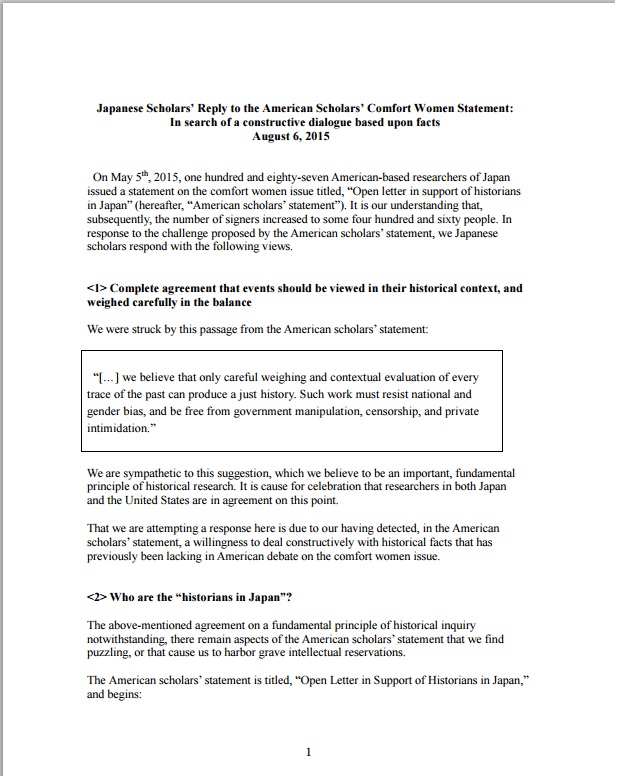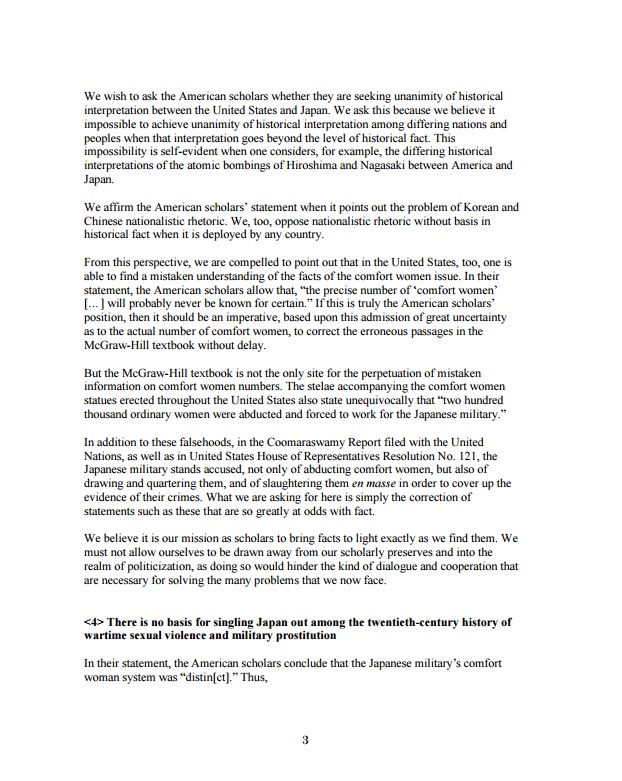憲法が、国家権力が好き勝手しないように歯止めをかけ、国家権力の暴走から国民の自由を守っている。このことは非常に重要なことです。今回の平和安全法制整備法案で憲法学者が違憲と解釈し主張する根拠の幾分かはここから発していることは十分理解できます。
しかし、法益の視点から述べる憲法学者がいらっしゃらなかったので、その視点から一つの主張を述べたい。
憲法前文の冒頭に「日本国民は、正当に選挙された国会における代表者を通じて行動し*」とあるように、主権者たる国民の意思は立法機関を通じてなされるというのが、日本国憲法の大前提です。つまり国民主権が私たちの憲法の第一理念として一番最初に記載されていることを忘れてはなりません。
日本国憲法の立脚点として、最高法規の権原が国民の意思に基ずくと宣言し、その守るべき最大の法益たる国民の主権を、(過去の大日本国憲法下の政治形態のもとでの)「政府」と対峙させて日本国憲法を位置付けるのがこの一文です。
ここで守られる法益は、国民の自由=基本的人権と国民の意思決定を「正当に選挙された国会における代表者を通じて」国家権力の意思決定とするという、世界に向けた宣言なのです。
だからこそ、私は過去の投稿の中で『立憲政治下の国民の合意は、そのまま「憲法制定勢力」である』と主張したのです。これについて述べる学者が皆無なのは解釈学を以って憲法学とする日本の憲法学会の限界です。
もう一度言います。国家の有り方を主権者たる国民的合意として明文化したものを憲法とした・・ということを日本国憲法がイの一番の文章で宣言しているのです。
国民の意思決定を「正当に選挙された国会における代表者を通じて」国家権力の意思決定とすることこそ、国民主権の基礎であり基本的人権の基礎であるとする憲法の権原に触れる宣言がこの文なのです。98条にいう憲法の最高法規としての性格もこの宣言から容易に説明できます。
第九十八条 この憲法は、国の最高法規であつて、その条規に反する法律、命令、詔勅及び国務に関するその他の行為の全部又は一部は、その効力を有しない。日本国が締結した条約及び確立された国際法規は、これを誠実に遵守することを必要とする。
この98条は、そのすぐ前にある97条を大前提として、97条を理由として存在する条文なのです。
第九十七条 この憲法が日本国民に保障する基本的人権は、人類の多年にわたる自由獲得の努力の成果であつて、これらの権利は、過去幾多の試錬に堪へ、現在及び将来の国民に対し、侵すことのできない永久の権利として信託されたものである。
つまり、98条は憲法の権原が国民が主権を持つことにあることを根拠として、この条規に反する法令等の効力を制限しているのです。98条が97条の国民の基本的人権が国民の自由獲得努力の結果であると言う文脈に続いて語られていることがその証拠です。「国民の基本的人権が国民の自由獲得努力の結果」だからこそ最高法規だと言っているのです。
国民の意思決定を「正当に選挙された国会における代表者を通じて」国家権力の意思決定とする事の正当性がここにあるのです。
ですから、国民の意思(法益)を代表し、国民の基本的人権を守るために国権の最高機関である立法府が行う行為が、直ちに違憲の可能性があると判断されるのは、「国民の基本的人権を守る」というこの一点に反することのみであると私は主張します。それも単なる権利の制限ではなく、否定につながる要件が含まれる必要があると思います。
国民の意思こそ立憲制民主主義下の「憲法制定勢力」であり、守られるべき法益の最も重要なものなのです。だからこそ、国会に2/3の多数を以って憲法改正の発議権を与えたのです。本来、現憲法に違反するはずの「改正憲法法案」が審議され国会を通過しても違憲とされないのは、国民の合意こそが「憲法制定勢力」だからです。単に、憲法にそう記されているからではないと強調したいと思います。
今般の平和安全法制整備法案について、違憲を理由に審議採決を行うことを批判する宣伝が憲法学者の意見を盾として行われています。しかし、その憲法学者は意見を述べているにすぎないのです。しかもそれは「解釈」について述べているのにすぎません。どんなに解釈が正しくとも、その「解釈」が国民の合意(法益)であるはずがないのです。合意は国会でしか示されないのです。そう憲法が宣言しているのです。
徒に憲法の解釈を議論するのではなく、法律によって守られるべき対象(法益)をどう守るか、その法益に対する脅威や危険とは何なのかを論じる必要が、この理屈によってお分かりいただければ幸いです。
平和安全法制整備法案の法益についても、その論点を討論してもらいたいのです。
日本国憲法前文の冒頭文「日本国民は、正当に選挙された国会における代表者を通じて行動し、われらとわれらの子孫のために、諸国民との協和による成果と、わが国全土にわたって自由のもたらす恵沢を確保し、政府の行為によって再び戦争の惨禍が起ることのないやうにすることを決意し、ここに主権が国民に存することを宣言し、この憲法を確定する」
第九十七条 この憲法が日本国民に保障する基本的人権は、人類の多年にわたる自由獲得の努力の成果であつて、これらの権利は、過去幾多の試錬に堪へ、現在及び将来の国民に対し、侵すことのできない永久の権利として信託されたものである。
第九十八条 この憲法は、国の最高法規であつて、その条規に反する法律、命令、詔勅及び国務に関するその他の行為の全部又は一部は、その効力を有しない。日本国が締結した条約及び確立された国際法規は、これを誠実に遵守することを必要とする。
Verfassungsgebende Gewalt / Puvoir constituant は、憲法制定権力と訳さず、憲法制定勢力とする。概念が生まれた歴史的経緯を調べられた方にはご納得いただけると思う。
憲法制定能力をもちうる主体に対する名称である。




















